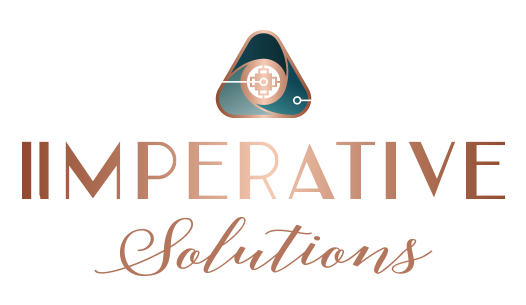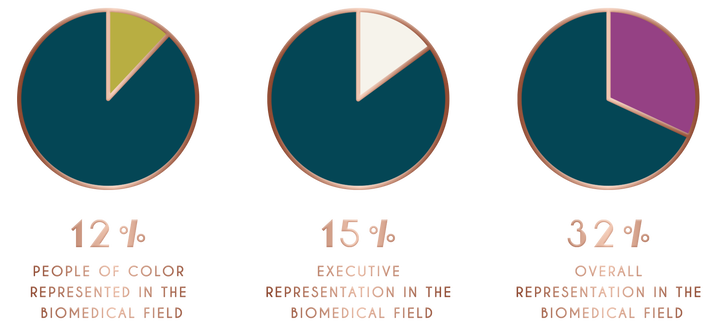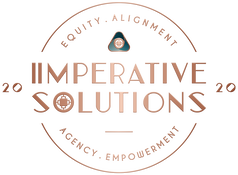Imperative Solutions is a change management consultancy firm dedicated to empowering organizations to assume agency over the diversity, equity, and inclusion initiatives that inform their corporate culture. We provide a breadth of experience along with effective strategies and tools to educate, support, and foster employee engagement and psychological safety. Our goal is that clients hold themselves accountable to their own success and understand that representation and fairness are not only a social responsibility, but also a business imperative.
|
im·per·a·tive /əmˈperədiv/ – Essential, necessary, mandatory, important, urgent
so·lu·tion /səˈlo͞oSH(ə)n/ – The correct answer to a problem or difficult situation. A guide or resolution, the key
Imperative Solutions – Offers an essential resolution to a myriad of challenging situations where there are no one-size fits all answers, but instead a sound strategy tailored to your organization’s specific needs.
Equity. Alignment. Agency. Empowerment – Our tagline and key drivers for successful diversity and inclusion practice; the active expressions that companies must incorporate into their DEI programs, fully supported by and paramount to Imperative Solutions consulting strategy.
Equity. Alignment. Agency. Empowerment – Our tagline and key drivers for successful diversity and inclusion practice; the active expressions that companies must incorporate into their DEI programs, fully supported by and paramount to Imperative Solutions consulting strategy.
How often have you heard there just aren't any qualified (insert any minority) applicants? Perhaps you've even made the statement. Well, you are not alone–the lack of diversity across industries is nothing new and it has been a well-documented issue in biotech for decades. In fact, STEM fields (science, technology, engineering, and mathematics) are historically homogenous in terms of race and ethnicity and remain male-dominated fields. Although strides have been made in gender parity, there is still more work to be done in leveling the playing field when it comes to race.
A March 2020 report from the Biotechnology Innovation Organization (BIO) 1 , the world's largest trade association representing biotechnology companies, academic institutions, state biotechnology centers and related organizations across the United States and in more than 30 other nations, reports–diversity in biotech companies decreases at higher levels of management, especially in bigger, more profitable companies. Additional data published by BIO shows that women comprise 45% of all biotech. However, they only account for 30% of executive leadership, and 18% of board membership. 1
A March 2020 report from the Biotechnology Innovation Organization (BIO) 1 , the world's largest trade association representing biotechnology companies, academic institutions, state biotechnology centers and related organizations across the United States and in more than 30 other nations, reports–diversity in biotech companies decreases at higher levels of management, especially in bigger, more profitable companies. Additional data published by BIO shows that women comprise 45% of all biotech. However, they only account for 30% of executive leadership, and 18% of board membership. 1
Racial and ethnic diversity numbers also highlight significant opportunities for improvement as another BIO study reveals that 66% of biotech employees who disclosed their race were White, 24% Asian, 6%. Hispanic and 4% Black.1 Those numbers shift substantially at the CEO level, where 88% of company heads are White, 5% Black, 3% Asian and 3% Hispanic. 4 Sadly, 12% of companies employ no people of color, while only 32% are represented overall. This drops to 15% and 14% at the executive level and board leadership, respectively. Further stratification of these numbers shows that African Americans, Hispanic/LatinX, Multiracial, Native American/Alaskan Native, Native Hawaiian/Pacific Islanders, account for fewer than 5% each and even less at executive levels. 1
These disparities are seen locally as well, as African Americans account for 6% of San Diego county’s overall workforce but just 3% of biotech, according to the San Diego Workforce Partnership. Hispanics or Latinos, who represent a third of the county’s workforce, make up 16% of biotech. 4 Asian Americans, who only make up 5.6% of the U.S. population according to 2017 Census Bureau population estimates 2 , are the one minority group in biotech and biopharmaceuticals that is well represented, comprising 22% of total employees, 9% of executive leadership and 11% of executive board composition 1, an incongruence arguably attributable to the Model Minority Myth. (Find this and other terms in our Glossary.)
Despite declining employee engagement and recent calls to action, many companies are only now assessing the benefits of diversity and inclusion programs. Most biotech firms including my own with its 20+ year history, are still in the nascent stages of developing their diversity and inclusion strategy, much less implementing actual training. Others still, have gone as far as excusing their failure to close diversity gaps citing, “the unfortunate reality is that there is a very limited pool of (diverse) talent to recruit from.” 3 However, as a minority with both a long tenure in the field and an extensive network, I know this to be a fallacy. Many companies do not hire diversely because they have not hired diversely. If human resources is comprised primarily of a dominant group, more than likely the workforce will reflect the same. Many companies do not know where to source diverse talent and fail to look beyond their “go to” schools and other well-established pools, to recruit. This is symptomatic of a dearth of awareness within every industry.
While representation, equity, and inclusion are essential to all fields, I truly believe that change must first begin at home. Consequently, Imperative Solutions’ initial focus is biotechnology, medicine, scientific institutes of learning, and clinical research organizations. As I approach my 20th anniversary in biotech, I am woefully reminded that my own industry known for tackling tough problems still hasn’t cracked one: diversity 4 , an issue that Imperative Solutions aims to coach and support companies through as they move toward positive lasting change.
These disparities are seen locally as well, as African Americans account for 6% of San Diego county’s overall workforce but just 3% of biotech, according to the San Diego Workforce Partnership. Hispanics or Latinos, who represent a third of the county’s workforce, make up 16% of biotech. 4 Asian Americans, who only make up 5.6% of the U.S. population according to 2017 Census Bureau population estimates 2 , are the one minority group in biotech and biopharmaceuticals that is well represented, comprising 22% of total employees, 9% of executive leadership and 11% of executive board composition 1, an incongruence arguably attributable to the Model Minority Myth. (Find this and other terms in our Glossary.)
Despite declining employee engagement and recent calls to action, many companies are only now assessing the benefits of diversity and inclusion programs. Most biotech firms including my own with its 20+ year history, are still in the nascent stages of developing their diversity and inclusion strategy, much less implementing actual training. Others still, have gone as far as excusing their failure to close diversity gaps citing, “the unfortunate reality is that there is a very limited pool of (diverse) talent to recruit from.” 3 However, as a minority with both a long tenure in the field and an extensive network, I know this to be a fallacy. Many companies do not hire diversely because they have not hired diversely. If human resources is comprised primarily of a dominant group, more than likely the workforce will reflect the same. Many companies do not know where to source diverse talent and fail to look beyond their “go to” schools and other well-established pools, to recruit. This is symptomatic of a dearth of awareness within every industry.
While representation, equity, and inclusion are essential to all fields, I truly believe that change must first begin at home. Consequently, Imperative Solutions’ initial focus is biotechnology, medicine, scientific institutes of learning, and clinical research organizations. As I approach my 20th anniversary in biotech, I am woefully reminded that my own industry known for tackling tough problems still hasn’t cracked one: diversity 4 , an issue that Imperative Solutions aims to coach and support companies through as they move toward positive lasting change.
| life-sciences-and-biotech-workforce.png | |
| File Size: | 202 kb |
| File Type: | png |
WOMAN . MINORITY . VETERANAuthentic. Dependable. Honest. Transparent. Warm. Proficient. Dynamic.– just a few of the many adjectives that have been used to describe Imperative Solutions Principal and Chief Executive Officer, Keisha Robinson. A Norfolk, Virginia native, Keisha moved to California in 2015 to advance her career in Precision Medicine. Apart from her entrepreneurial pursuits, Keisha has most recently worked in Medical Genomics as an Associate Director of Clinical Research at a leading biotech company in San Diego.
|
Keisha’s extensive clinical research experience spans multiple therapeutic areas across a number of business types from start-ups and clinical research organizations to government contractors. She has a proven track record that includes global leadership, business project management, technical writing, and public speaking. Her stellar organization skills, cultural competence and ability to embrace change and problem solve, have allowed Keisha to drive innovation, positively affect organizational performance, and empower young professionals. Keisha has a Bachelor of Science in Biology, and dual Masters’ degrees in Business Management and Project Management. Additionally, she holds a certification in Diversity and Inclusion from Cornell University. Keisha has also completed her Executive Certification in Diversity Coaching via Coach Diversity Institute and Howard University and is awaiting her accreditation from the International Coaching Federation.
In her own words… As a black woman in STEM, an exceptionally patriarchal field, I’ve often had to imagine myself in spaces where we had not previously held a seat at the table. Consequently, I am a passionate advocate who is acutely aware of the significance diversity, equity, and inclusion hold. Recently, while citing the lack of diversity at my own company, specifically as it pertained to the absence of African Americans, I was challenged–“well didn’t you research the company before applying?” Slightly taken aback, I responded that the lack of diversity in biotech was not a new construct and that if its number of African American employees was the barometer by which I measured a company’s suitability for employment…I would never have a job. This conversation was a stark reminder of the importance of representation in corporate spaces. I’ve learned that it always comes back to this proverbial Catch 22–If companies do not source diverse talent, they will be ill-equipped and even less inclined to provide the necessary resources and agency essential to specific groups “showing up” as themselves. Then in the absence of psychological safety and visible provisions like affinity groups, holiday observances, or even depictions in corporate marketing–companies inherently fail to attract diverse talent, an impasse where there are no winners.
In the wake of George Floyd’s murder and the senseless deaths of many African Americans amid the worst pandemic our world has ever seen, my commitment to both social and professional justice has been reignited. Rather than lament America’s checkered past or become immobilized by the racially polarizing events of its present, I have turned my focus toward the future. Ultimately, inspired by my many experiences in the field I decided it was time to not only become, but also champion the change I want to see. I present to you Imperative Solutions. It is my personal commitment, professional charge, and distinct honor to help companies move beyond antiquated industry norms to set their own standards and lead the change for…
In her own words… As a black woman in STEM, an exceptionally patriarchal field, I’ve often had to imagine myself in spaces where we had not previously held a seat at the table. Consequently, I am a passionate advocate who is acutely aware of the significance diversity, equity, and inclusion hold. Recently, while citing the lack of diversity at my own company, specifically as it pertained to the absence of African Americans, I was challenged–“well didn’t you research the company before applying?” Slightly taken aback, I responded that the lack of diversity in biotech was not a new construct and that if its number of African American employees was the barometer by which I measured a company’s suitability for employment…I would never have a job. This conversation was a stark reminder of the importance of representation in corporate spaces. I’ve learned that it always comes back to this proverbial Catch 22–If companies do not source diverse talent, they will be ill-equipped and even less inclined to provide the necessary resources and agency essential to specific groups “showing up” as themselves. Then in the absence of psychological safety and visible provisions like affinity groups, holiday observances, or even depictions in corporate marketing–companies inherently fail to attract diverse talent, an impasse where there are no winners.
In the wake of George Floyd’s murder and the senseless deaths of many African Americans amid the worst pandemic our world has ever seen, my commitment to both social and professional justice has been reignited. Rather than lament America’s checkered past or become immobilized by the racially polarizing events of its present, I have turned my focus toward the future. Ultimately, inspired by my many experiences in the field I decided it was time to not only become, but also champion the change I want to see. I present to you Imperative Solutions. It is my personal commitment, professional charge, and distinct honor to help companies move beyond antiquated industry norms to set their own standards and lead the change for…
"We are made wise not by the recollection of our past, but by the responsibility for our future."
- George Bernard Shaw
- George Bernard Shaw
















